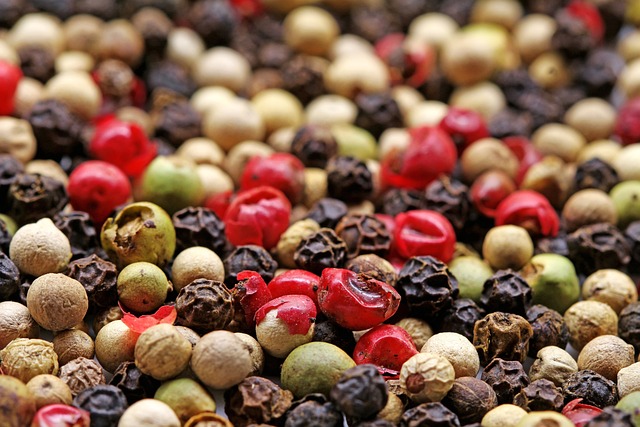Contents
How Black Pepper Promotes Healthy Gut Bacteria and Supports Digestion
Black pepper is a popular spice used in cuisines all over the world. Apart from its ability to add flavor to food, black pepper also has several health benefits. One of the most notable benefits of black pepper is its ability to promote healthy gut bacteria and support digestion.
Studies have shown that black pepper contains compounds that help to stimulate digestive enzymes, which in turn, aids in the breakdown of food. Additionally, black pepper has antimicrobial properties, which can help to kill off harmful bacteria in the gut and promote the growth of beneficial bacteria.
One of the key beneficial bacteria that black pepper can promote is Lactobacillus. This type of bacteria is crucial for maintaining a healthy gut and preventing digestive issues such as bloating, gas, and constipation. Lactobacillus also plays a key role in bolstering the immune system and reducing inflammation in the body.
In conclusion, incorporating black pepper into your diet is an easy way to promote healthy gut bacteria and support digestion. So next time you’re seasoning your food, be sure to add a dash of this versatile spice!
Keywords: black pepper, healthy gut bacteria, digestion, digestive enzymes, antimicrobial, harmful bacteria, beneficial bacteria, Lactobacillus, bloating, gas, constipation, immune system, inflammation.
Introduction
Black pepper is one of the most common spices used in cooking. It not only provides flavor but also has several health benefits. One of the most significant advantages of black pepper is that it promotes healthy gut bacteria and supports digestion. In this blog post, we will explore the various ways black pepper benefits gut health.
What is Black Pepper?
Black pepper, also known as Piper nigrum, is a flowering vine that produces small fruit known as peppercorns. The fruit is dried and used as a spice in cooking. Black pepper is native to India and is now grown in different parts of the world. It is available in various forms such as whole peppercorns, ground pepper, and even as an essential oil.
Black Pepper’s Health Benefits
Benefits of Black Pepper For the Digestive System
Black pepper is known to promote good digestion. Compounds such as piperine in black pepper help stimulate the production of digestive juices, which helps break down food in the stomach. This process aids digestion and reduces symptoms such as bloating, flatulence, and constipation. Furthermore, black pepper also helps prevent the formation of gas in the digestive tract, which can lead to excessive bloating or discomfort.
Promotes Healthy Gut Bacteria
Black pepper contains essential compounds known as prebiotics that support the growth of beneficial gut bacteria. Prebiotics are non-digestible fibers that pass through the digestive tract undigested, but they serve as food for the beneficial bacteria in the gut. By promoting the growth of healthy gut bacteria, black pepper can help improve overall gut health and immune function.
Antioxidant and Anti-Inflammatory Properties
Black pepper has antioxidant and anti-inflammatory properties that can help protect the digestive system from oxidative stress and inflammation. These properties help reduce the risk of developing various digestive disorders such as ulcers, irritable bowel syndrome (IBS), and inflammatory bowel disease (IBD).
How to Use Black Pepper
Black pepper is a versatile spice and can be added to a wide range of dishes. Whole peppercorns can be crushed using a mortar and pestle, and the resulting powder can then be added to soups, stews, or roasts. Ground black pepper can be sprinkled over salads or scrambled eggs. Black pepper essential oil can be added to a diffuser or diluted with a carrier oil and applied topically.
The Bottom Line
Black pepper is a healthy spice that is rich in essential compounds that promote good digestion and gut health. Incorporating black pepper into your diet can help reduce digestive symptoms, promote healthy gut bacteria, and protect against digestive disorders.
For more information on gut bacteria, be sure to check out our recent post on ”The Benefits of Gut Health and How to Improve it.”
Frequently Asked Questions about How Black Pepper Promotes Healthy Gut Bacteria and Supports Digestion
What is black pepper?
Black pepper (Piper nigrum) is a common spice used in many cuisines worldwide. It is made from the dried berries of the pepper plant and is usually ground into a fine powder.
How does black pepper promote healthy gut bacteria?
Black pepper contains a naturally occurring compound called piperine, which has been shown to stimulate the growth of beneficial gut bacteria. These bacteria help to break down food, absorb nutrients, and boost immunity.
What are the benefits of healthy gut bacteria?
Healthy gut bacteria have many important roles in maintaining overall health. They can improve digestion, boost immunity, reduce inflammation, and even support mental health.
How does black pepper support digestion?
In addition to promoting healthy gut bacteria, black pepper can also stimulate the production of digestive enzymes. This can help improve the breakdown and absorption of nutrients from food.
Are there any risks or side effects of consuming black pepper?
Black pepper is generally considered safe for most people when consumed in normal amounts. However, some people may be allergic or sensitive to it. Additionally, consuming excessive amounts of black pepper may cause gastrointestinal irritation or other digestive issues.
The Benefits of Black Pepper for Digestion
Black pepper is a popular spice that is used not just for its flavor but also for the numerous health benefits it offers. One of the most significant benefits of black pepper is its ability to aid digestion.
How Does Black Pepper Help with Digestion?
The piperine compound present in black pepper helps to stimulate the digestive juices in the stomach, which in turn improves the digestion of food. It also helps to prevent stomach gas and bloating. Black pepper also helps to increase the secretion of hydrochloric acid in the stomach, which is essential for breaking down proteins and other complex nutrients, making them easily digestible.
Additionally, black pepper has antibacterial properties that help to eliminate harmful bacteria in the digestive system, reducing the risk of infections and other digestive disorders.
Using Black Pepper for Digestion
Black pepper can be used in various ways to aid digestion. It can be added to cooked meals, salads, and soups. Black pepper essential oil can be massaged onto the stomach area to promote digestion. Powdered black pepper mixed with honey can also be taken before meals to aid digestion.
To reap the maximum benefits of black pepper for digestion, it is recommended to use freshly ground pepper as it contains the maximum amount of piperine.
If you’re interested in learning more about black pepper, check out the Wikipedia page on black pepper.
How Black Pepper Promotes Healthy Gut Bacteria and Supports Digestion
Introduction
- Black pepper is a common spice used in many cuisines
- It has been found to have several health benefits, including promoting healthy gut bacteria and supporting digestion
Active Compound in Black Pepper
- The active compound in black pepper is called piperine
- Piperine has been shown to increase the bioavailability of nutrients in food, making them easier to digest and absorb
Anti-Inflammatory and Antioxidant Properties
- Black pepper has anti-inflammatory and antioxidant properties that can help reduce inflammation in the gut and protect against oxidative stress
- Reducing inflammation and oxidative stress can improve overall gut health and support digestion
Promotes Healthy Gut Bacteria
- Black pepper has been found to promote the growth of beneficial gut bacteria, such as lactobacilli and bifidobacteria
- These bacteria play an important role in maintaining a healthy gut microbiome and promoting overall health
Conclusion
- Black pepper is a widely used spice that can offer numerous health benefits
- It promotes healthy gut bacteria, supports digestion, and has anti-inflammatory and antioxidant properties








































